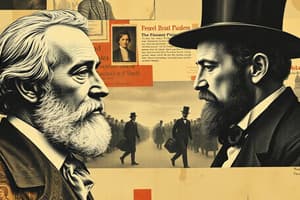Podcast
Questions and Answers
Which of the following best describes a common goal shared by many of the Enlightenment philosophes?
Which of the following best describes a common goal shared by many of the Enlightenment philosophes?
- To promote reason, individual liberty, and reform of societal structures. (correct)
- To advocate for traditional social hierarchies and religious dogma.
- To establish a global empire controlled by European powers.
- To reinforce the power of the monarchy through divine right.
How did Enlightenment ideals influence the French Revolution?
How did Enlightenment ideals influence the French Revolution?
- By inspiring revolutionary thinkers with ideas of liberty, equality, and popular sovereignty. (correct)
- By reinforcing the feudal system and the privileges of the aristocracy.
- By providing a justification for the absolute authority of the monarchy.
- By advocating for a return to traditional religious values and practices.
Which of the following factors contributed most significantly to the radicalization of the French Revolution, culminating in the Reign of Terror?
Which of the following factors contributed most significantly to the radicalization of the French Revolution, culminating in the Reign of Terror?
- The threat of foreign invasion and internal counter-revolution. (correct)
- The widespread adoption of mercantilist economic policies.
- The restoration of the Catholic Church's authority.
- The successful implementation of democratic reforms.
In what ways did Napoleon's government reflect and contradict Enlightenment principles?
In what ways did Napoleon's government reflect and contradict Enlightenment principles?
Based on the Map Details provided, if you were traveling from London to Constantinople in 1715 by sea, which of the following bodies of water would you most likely navigate?
Based on the Map Details provided, if you were traveling from London to Constantinople in 1715 by sea, which of the following bodies of water would you most likely navigate?
Which of the following best describes the core difference between the political theories of absolute monarchy and limited monarchy?
Which of the following best describes the core difference between the political theories of absolute monarchy and limited monarchy?
How did the agricultural revolution directly contribute to the expansion of international trade during the 18th century?
How did the agricultural revolution directly contribute to the expansion of international trade during the 18th century?
What was a primary consequence of the rivalry between Austria/Prussia and Britain/France during the 18th century?
What was a primary consequence of the rivalry between Austria/Prussia and Britain/France during the 18th century?
How did the theories of John Locke influence the development of limited monarchy and constitutionalism?
How did the theories of John Locke influence the development of limited monarchy and constitutionalism?
In what way did the scientific discoveries of Copernicus, Kepler, Galileo, and Newton challenge traditional worldviews?
In what way did the scientific discoveries of Copernicus, Kepler, Galileo, and Newton challenge traditional worldviews?
What role did slavery play in the development of transatlantic trade during the 18th century?
What role did slavery play in the development of transatlantic trade during the 18th century?
How did Enlightened Despotism attempt to reconcile Enlightenment ideals with autocratic rule?
How did Enlightened Despotism attempt to reconcile Enlightenment ideals with autocratic rule?
In what manner did Russia emulate Western European powers like France and Prussia during the 17th and 18th centuries?
In what manner did Russia emulate Western European powers like France and Prussia during the 17th and 18th centuries?
Flashcards
"Philosophes"
"Philosophes"
Intellectuals who applied reason and science to society, advocating for reform and individual rights.
Enlightenment Ideals
Enlightenment Ideals
Liberty, equality, and fraternity, challenging the old order.
Causes of the French Revolution
Causes of the French Revolution
Social inequality, economic hardship, and political mismanagement.
"The Terror"
"The Terror"
Signup and view all the flashcards
Kingdom of Prussia
Kingdom of Prussia
Signup and view all the flashcards
Absolute Monarchy
Absolute Monarchy
Signup and view all the flashcards
Limited Monarchy
Limited Monarchy
Signup and view all the flashcards
Mercantilism
Mercantilism
Signup and view all the flashcards
Triangular Trade
Triangular Trade
Signup and view all the flashcards
Geocentric Model
Geocentric Model
Signup and view all the flashcards
Heliocentric Model
Heliocentric Model
Signup and view all the flashcards
Enlightened Despotism
Enlightened Despotism
Signup and view all the flashcards
Seven Years' War
Seven Years' War
Signup and view all the flashcards




